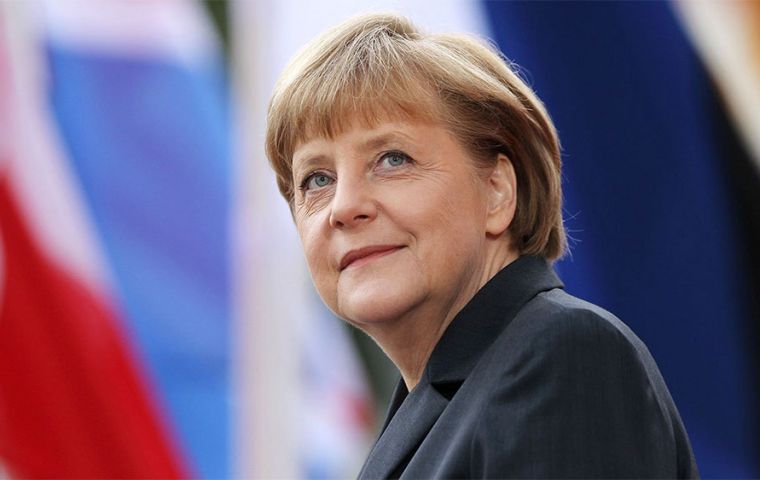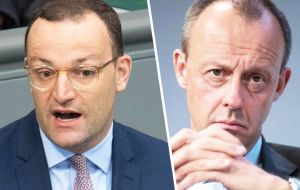MercoPress. South Atlantic News Agency
End of an era: powerful Angela Merkel announces her exit from the world stage
 Dominant figure in German and European politics for more than a decade will step down as party leader in December and not seek reelection as chancellor in 2021
Dominant figure in German and European politics for more than a decade will step down as party leader in December and not seek reelection as chancellor in 2021  Following Merkel's announcement, Health Minister Jens Spahn and former rival Friedrich Merz announced their candidacies as CDU leaders
Following Merkel's announcement, Health Minister Jens Spahn and former rival Friedrich Merz announced their candidacies as CDU leaders  The surprising timing suggests Merkel is preparing to end the “grand coalition” government with the Social Democratic Party (SPD) before the full five-year term
The surprising timing suggests Merkel is preparing to end the “grand coalition” government with the Social Democratic Party (SPD) before the full five-year term Marking the end of an era, German Chancellor Angela Merkel's announced on Monday her last term in office. The dominant figure in German and European politics for more than a decade said she will step down as party leader of her Christian Democratic Union, CDU, in December and not seek reelection as chancellor in 2021.
Merkel made every effort to make it seem like this was all part of the plan. In a typically calm and contained press conference at CDU HQ in Berlin, the chancellor said she had made the decision to relinquish the party helm months ago — though she admitted it was a major U-turn from her previous conviction that the chancellor had to be the party leader.
“That is a risk, no question,” she told reporters, “but after weighing up the advantages and disadvantages I still came to the conclusion that it is justified. … I with this decision will contribute to helping the government to finally concentrate on governing well. … I want my party to have the freedom to be able to prepare properly for the future.”
At first glance, the move could be read as a tactical retreat: placate internal party critics to preserve her final chancellorship a little longer. It certainly meant she avoided the ugly spectacle of a hostile leadership challenge from the right of the party at the CDU's December's party conference.
Unsurprisingly, those particular vultures began circling within hours of Merkel's announcement, as prominent critic Health Minister Jens Spahn and former rival Friedrich Merz announced their candidacies.
Olaf Böhnke, analyst at the independent think tank Das Progressive Zentrum, said the move “proved once more that she's one of the best crisis managers I've ever seen.”
“Usually she goes with the image that she's the last to react to something,” he said. “She leaves others to discuss the political issues and when the consensus is on the horizon, then she steps up.”
Unrest has been growing on the right of her party for months and erupted publicly following two recent regional election failures: in Bavaria two weeks ago the CDU sister party the Christian Social Union dropped ten percentage points, and great swathes of its parliamentary power, while in Hesse last Sunday night the CDU lost more than eleven points.
But Merkel's timing had caught everyone off guard. After all, the Hesse election result was not as bad as it could have been: the CDU was still the strongest party and still had a (wafer-thin) mandate to carry on governing with the Green party. But, argued Böhnke, Merkel knew that the underlying trend demanded some kind of symbolic move.
“She has the feeling that things are going wrong and something has to change,” said Böhnke. “And I could imagine that this really makes a difference for people who had been very skeptical. They lost because people felt the CDU had lost touch with its base, and this could be the symbolic step to show she understood.”
Other pundits saw the move as a way of managing her exit as gracefully as possible. As Josef Janning, Berlin chief at the European Council for Foreign Relations, pointed out, few expected her to try again in 2021 anyway, so this decision was only natural. “Even if she had tried for re-election [as party leader] in December, that would not change her term as chancellor,” he pointed out.
Janning said the surprising timing suggests she is preparing to end the “grand coalition” government with the Social Democratic Party (SPD) before the full five-year term is up.
“She's accelerating the process,” he said. “Her strategy for months has been to stay in office, but not run for re-election. Now, depending on how her party responds, she can use the next rift in the coalition to say: That's it.”
How long Merkel's final government survives depends on who replaces her as party leader in December. That person will almost certainly be the candidate the CDU sends into the race to succeed Merkel as chancellor in the next election.
If the party elects a Merkel loyalist, like General Secretary Annegret Kramp-Karrenbauer or Economy Minister Peter Altmaier, the… coalition will probably last longer with Merkel at the helm. But if the next leader is a Merkel critic, like Spahn or former parliamentary group leader Friedrich Merz, he would probably push for new elections sooner rather than later.




Top Comments
Disclaimer & comment rules-

Read all commentsFilthy commie.
Oct 30th, 2018 - 10:47 am 0Commenting for this story is now closed.
If you have a Facebook account, become a fan and comment on our Facebook Page!